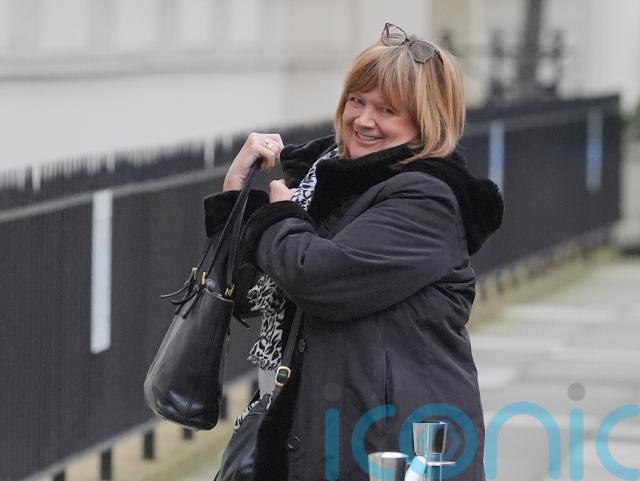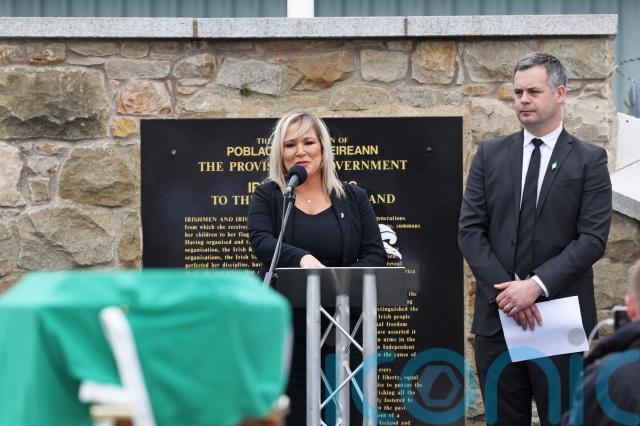
A politically divided Stormont Executive led to “chaotic decision-making” during the Covid-19 pandemic, a public inquiry has concluded.
Baroness Heather Hallett’s report on government responses to Covid found that the political reaction to the public health emergency in Northern Ireland was “deeply divided along political lines and beset by leaks, leading to an incoherent approach”.
The report said the attendance of then deputy First Minister Michelle O’Neill at the funeral of veteran republican Bobby Storey in Belfast in June 2020, and her initial refusal to apologise, “contributed to tensions in the Northern Ireland Executive Committee”.
It also said there was the “inappropriate instigation of cross-community votes to make political points” by former first minister Baroness Arlene Foster.
The report published on Thursday focuses on the core political and administrative decision-making across the UK in response to the pandemic.

Political leaders were involved in significant decisions including how lockdowns were introduced, the closure of businesses and schools, and restrictions on public gatherings.
It concluded that the response in Northern Ireland, like the rest of the UK, was “a repeated case of too little, too late”.
The report said “the devolved administrations were too reliant on the UK government to lead the response”.
It said that in Northern Ireland, as in Scotland, Covid-19 was only discussed under “any other business” in meetings in late February 2020.
The report said: “It should have been equally apparent to the First Ministers and deputy First Ministers of the devolved administrations that, by this point, Covid-19 was the most pressing issue facing their governments.”
Examining the response to the second Covid wave in autumn 2020, the report said: “In Northern Ireland, politically divided Executive Committee meetings led to chaotic decision-making.
“A four-week circuit breaker was introduced on 16 October 2020, despite advice that a six-week intervention was needed.”
The report said the circuit breaker “ultimately proved inadequate”.
It added: “In the weeks that followed, Executive Committee meetings were deeply divided along political lines and beset by leaks, leading to an incoherent approach in which the circuit breaker restrictions were extended for one week, then lapsed for one week, before being reintroduced for two further weeks – with the one-week lapse in restrictions correlating with a 25% increase in cases.”
When examining decision-making, the report said: “Coordination of the Northern Ireland Executive’s response was weakened by the operational independence of departments and decision-making was marred by political disputes.”

The report said the powersharing arrangements in Northern Ireland are designed to ensure that each department has a significant degree of operational independence.
It added: “This weakened the ability of the Northern Ireland Executive to coordinate the pandemic response and there was no one sufficiently empowered to hold departments to account.
“The Department of Health (Northern Ireland), which was the lead government department with responsibility for the response at the outset of the pandemic, largely operated in a silo – especially in the early stages of the response.”
The report continued: “The distinct powersharing arrangements in Northern Ireland offered the opportunity to demonstrate that decisions were being made by all parties collectively for the greater good.
“Instead, however, on multiple occasions decision-making was marred by political disputes between Democratic Unionist Party and Sinn Fein ministers.
“The attendance of the deputy First Minister of Northern Ireland, Michelle O’Neill MLA, at the funeral of Bobby Storey in June 2020, and her initial refusal to apologise for this, contributed to tensions in the Northern Ireland Executive Committee.
“The four-day Executive Committee meeting from 9 to 12 November 2020 represented a low point in Northern Ireland politics during the pandemic.
“The confidentiality of discussions was undermined by leaks and there was inappropriate instigation of cross-community votes to make political points by the First Minister of Northern Ireland, Arlene Foster MLA.”
The report said the pandemic response also exposed “wider cultural issues”.
It said: “The very least the public should be entitled to expect is that those making the rules will abide by them. Instances where ministers and advisers appeared to break Covid-19 rules caused huge distress to the public.”
Ms O’Neill, now Northern Ireland’s First Minister, said the publication of the Covid inquiry’s second report was an “important milestone”.
She said: “I welcome the publication of the Module 2 Report and thank the chair and inquiry team for their work.
“It is an important milestone in the long journey of recovery after the pain and trauma of the Covid pandemic.
“Covid was an unprecedented global emergency and this report will provide further lessons from the experience at all levels of society.
“Those lessons must inform our preparedness for, and response to, any future pandemic or society-wide emergency in the future.
“Our thoughts are very much with those who lost loved ones during the pandemic.”
Subscribe or register today to discover more from DonegalLive.ie
Buy the e-paper of the Donegal Democrat, Donegal People's Press, Donegal Post and Inish Times here for instant access to Donegal's premier news titles.
Keep up with the latest news from Donegal with our daily newsletter featuring the most important stories of the day delivered to your inbox every evening at 5pm.